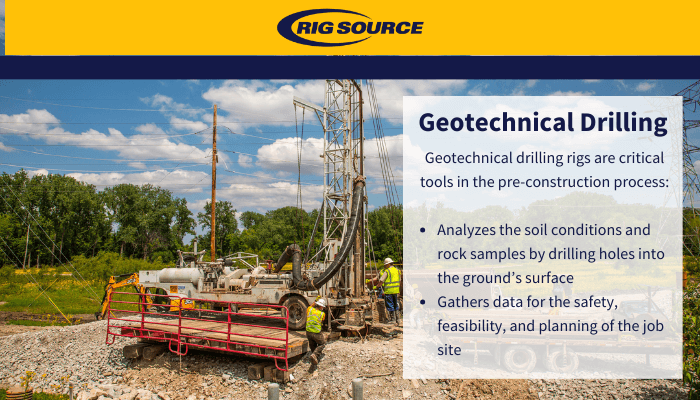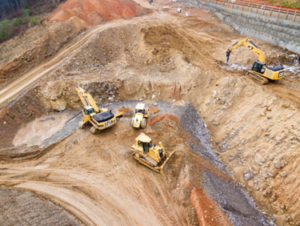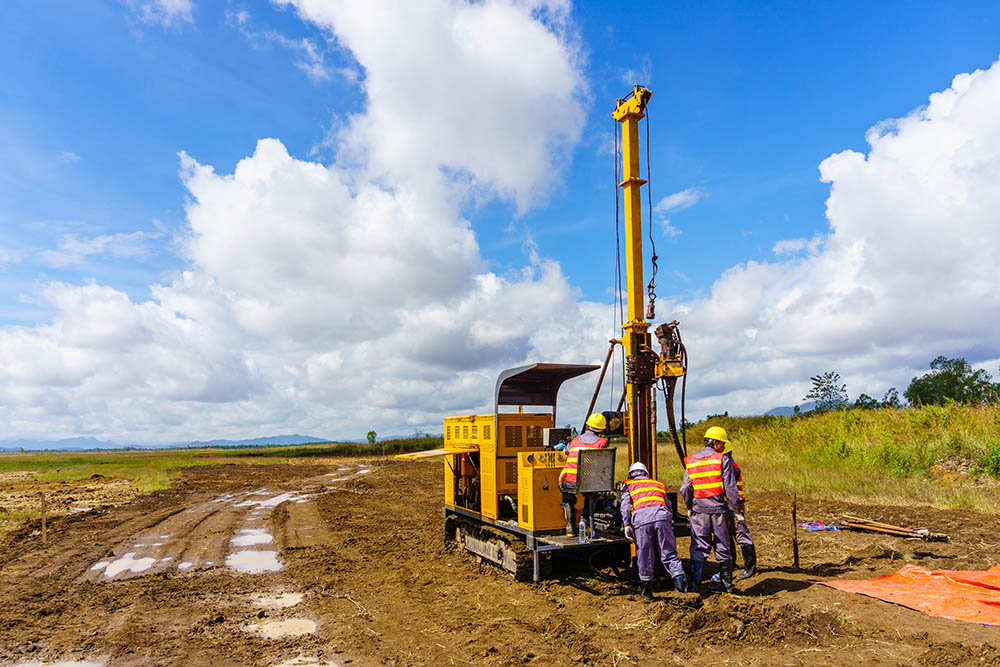Top Factors to Employ a Geotechnical Specialist for Your Construction Projects
Top Factors to Employ a Geotechnical Specialist for Your Construction Projects
Blog Article
The Significance of Geotechnical Engineering in Dealing With Ecological Difficulties and Enhancing Building And Construction Safety
Geotechnical design serves as a cornerstone in the junction of ecological stewardship and building safety, offering critical insights into the habits of soil and rock under different problems. By applying critical website investigations and tailored reduction actions, geotechnical engineers play a vital duty in guarding both human lives and eco-friendly honesty.

Duty of Geotechnical Design
Geotechnical engineering plays an essential role in the design and building of infrastructure by dealing with the behavior of soil and rock products under different problems. This field of engineering is necessary for comprehending the interaction between frameworks and the ground, which includes identifying the load-bearing capacity of dirt, analyzing stability, and forecasting potential settlement or failing.
Geotechnical engineers are in charge of performing website investigations, which entail sampling and testing dirt and rock to gather data on their physical and chemical residential properties. This information is vital for making foundations, keeping walls, and various other earth-retaining structures that make certain safety and durability. Geotechnical design informs the selection of suitable building techniques and products, thus decreasing dangers connected with dirt habits.
Additionally, the combination of geotechnical engineering concepts right into city preparation and environmental monitoring is critical for attending to challenges such as ground contamination and groundwater administration. By comprehending geotechnical factors, engineers can establish sustainable solutions that improve the strength of infrastructure against all-natural hazards, while likewise promoting ecological stewardship. Inevitably, the duty of geotechnical design is crucial for attaining secure, sturdy, and environmentally conscious construction practices.
Soil Erosion Reduction
Soil disintegration positions a significant danger to both ecological stability and facilities stability, affecting roughly 24 billion lots of fertile dirt shed annually worldwide. This sensation is intensified by variables such as logging, urbanization, and bad agricultural techniques. Geotechnical design plays a crucial function in establishing reliable soil disintegration mitigation techniques that safeguard both the atmosphere and construction tasks.
One technique entails the implementation of erosion control methods such as greenery growing, which stabilizes soil through root systems. In addition, the construction of keeping wall surfaces and balconies can successfully lower surface drainage and secure at risk locations from disintegration. Appropriate water drainage layout is additionally essential; it lessens water accumulation and guides excess drainage far from essential frameworks.
Additionally, geotechnical engineers utilize dirt stabilization methods, such as the application of geotextiles and eco-friendly floor coverings, to boost dirt communication and protect against degradation - geotechnical engineer description. Regular monitoring and evaluation of erosion-prone sites allow timely interventions, making certain lasting sustainability. By integrating these approaches, geotechnical engineering not just mitigates the effects of dirt disintegration however additionally adds to the resilience of infrastructure versus ecological obstacles, inevitably promoting a much safer and more sustainable constructed setting
Groundwater Security Techniques
Groundwater functions as an important resource for alcohol consumption water, agriculture, and industrial processes, making its security crucial for environmental sustainability and public health. Efficient groundwater defense strategies are crucial in minimizing contamination risks and making certain the long life of this source.

Routine surveillance of groundwater quality is also important, allowing very early detection of contamination resources and facilitating prompt removal efforts. Employing innovative technologies, such as geophysical surveys and remote noticing, help in identifying possible dangers to groundwater books.
Moreover, public education and learning and stakeholder engagement are crucial, promoting neighborhood assistance for groundwater security initiatives. geotechnical engineer description. By incorporating regulative procedures, technical improvements, and area involvement, we can develop an extensive framework that safeguards groundwater sources while promoting lasting advancement and building methods
Landslide Danger Management
Landslides present substantial risks to both human security and facilities, making reliable threat management methods essential. Geotechnical engineering plays an important role in identifying, examining, and mitigating landslide dangers. A detailed understanding of slope security, soil auto mechanics, and hydrology is essential for developing reliable danger management plans.
The first step in landslide risk administration entails extensive website examinations, which include geological mapping and dirt testing. These investigations aid engineers evaluate the capacity for landslides by recognizing critical factors such as slope angles, soil structure, and water content. Using innovative modern technologies such as remote noticing and geophysical studies can boost the accuracy of these analyses.
When risks are recognized, suitable reduction procedures can be carried out. These may consist of engineering options such as keeping walls, water drainage systems, and incline stablizing strategies. Keeping track of systems must be established to spot indicators of ground movement and changes in the original source water degrees, allowing for aggressive interventions.

Enhancing Construction Safety
Construction websites usually present a myriad of threats that can threaten employee safety and task honesty. Geotechnical engineering plays a vital duty in improving building and construction safety by providing vital understandings into subsurface problems. Through detailed dirt and rock analysis, geotechnical designers can recognize possible threats, such as dirt instability, groundwater issues, and seismic susceptabilities, which might compromise the safety and security of construction activities.
Applying geotechnical services, such as proper structure design and the use of keeping structures, mitigates these risks significantly. These solutions not only ensure the stability of the structures being developed but likewise create a much safer working atmosphere for construction personnel.
Additionally, promoting a culture of safety through training and adherence to developed safety methods better improves building and construction site safety and security. By site web incorporating geotechnical experience right into the planning and execution phases, building tasks can attain greater security standards, ultimately protecting workers and guaranteeing effective task conclusion.
Verdict
In final thought, geotechnical engineering offers as an essential self-control in promoting and taking on environmental difficulties construction safety and security. Through reliable dirt disintegration mitigation, groundwater security approaches, and landslide danger management, geotechnical engineers add to the advancement of durable facilities.
Geotechnical engineering serves as a foundation in the crossway of environmental stewardship and building safety and security, giving critical insights right into the actions of dirt and rock under numerous conditions. Geotechnical design notifies the choice of proper building and construction techniques and products, therefore minimizing threats associated with dirt actions.
Geotechnical engineering plays a critical role in developing efficient soil disintegration mitigation methods that protect both the atmosphere and building and construction projects.
Furthermore, geotechnical engineers use dirt stabilization techniques, such as the application of geotextiles and eco-friendly floor coverings, to boost soil cohesion and protect against deterioration. Through detailed soil and rock evaluation, geotechnical designers can identify possible dangers, such as dirt instability, groundwater issues, and seismic susceptabilities, which might jeopardize the security of building tasks.
Report this page